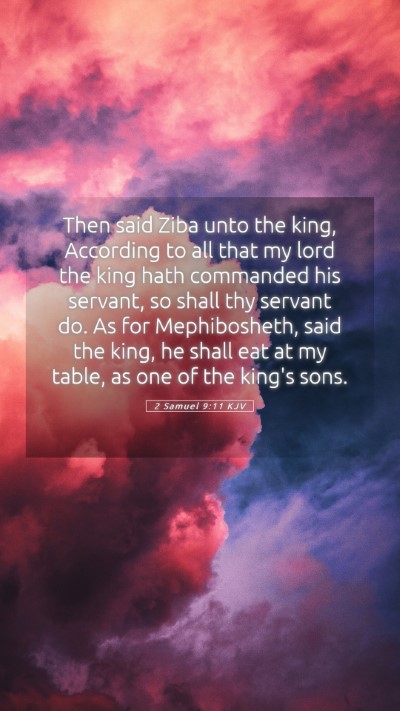Old Testament
Genesis Exodus Leviticus Numbers Deuteronomy Joshua Judges Ruth 1 Samuel 2 Samuel 1 Kings 2 Kings 1 Chronicles 2 Chronicles Ezra Nehemiah Esther Job Psalms Proverbs Ecclesiastes Song of Solomon Isaiah Jeremiah Lamentations Ezekiel Daniel Hosea Joel Amos Obadiah Jonah Micah Nahum Habakkuk Zephaniah Haggai Zechariah Malachi2 Samuel 9:11 Meaning
What is the meaning of 2 Samuel 9:11?
Then said Ziba unto the king, According to all that my lord the king hath commanded his servant, so shall thy servant do. As for Mephibosheth, said the king, he shall eat at my table, as one of the king's sons.
2 Samuel 9:11 Bible Verse Meaning
Understanding 2 Samuel 9:11: A Comprehensive Commentary
This passage reveals profound themes of grace, loyalty, and the fulfillment of promises in the context of David’s relationship with Mephibosheth. This commentary merges insights from public domain commentaries by Matthew Henry, Albert Barnes, and Adam Clarke to enrich your Bible verse understanding.
Bible Verse: 2 Samuel 9:11
“Then said Ziba unto the king, According to all that my lord the king hath commanded his servant, so shall thy servant do. As for Mephibosheth, said the king, he shall eat at my table, as one of the king's sons.”
Contextual Background
Before delving into the implications of this verse, it's essential to understand its backdrop. Following the fall of Saul's dynasty, David, now king, seeks out any remaining descendants of Saul to show kindness for Jonathan's sake. This moment signifies the grace extended through David and emphasizes the ancient Near Eastern custom of protecting the remnants of a fallen dynasty.
Thematic Analysis
- Grace and Restoration: David’s invitation to Mephibosheth to dine at his table is an act of extraordinary grace. Despite Mephibosheth’s physical disability and the treacherous history both men share through Saul’s animosity towards David, David demonstrates the principle of favor that transcends personal history.
- Loyalty and Covenant: David’s actions reflect his loyalty to the covenant made with Jonathan. Albert Barnes emphasizes that this reflects the steadfast love of God, highlighting the deep bonds of friendship and loyalty that often impact our lives and decisions.
- Humility in Acceptance: Mephibosheth’s response to David’s kindness is one of humility, expressing how unworthy he feels for such honor. This reaction illustrates a fundamental aspect of Bible study insights: recognizing the grace bestowed upon us even when we feel unworthy.
Detailed Commentary
Matthew Henry elaborates on the notion of grace and how it shows that God’s grace can find the most unlikely recipients. The act of Mephibosheth eating at David's table symbolizes not only acceptance but also an extraordinary elevation from shame to honor.
Grace in the Old Testament
Henry draws parallels to grace shown in the Old Testament, reflecting on how God's character often reaches out to the marginalized and unworthy. The significance of dining at the king’s table resonates with themes in other scriptures, such as the Parable of the Great Banquet (Luke 14:15-24).
Mephibosheth's Identity
Adam Clarke highlights the importance of Mephibosheth's identity. Despite his disability, he was invited into the royal family, illustrating how spiritual lineage and God's favor surpass societal expectations and personal limitations. This aspect encourages readers to reflect on their identity in God’s kingdom.
Application to Daily Life
- Embracing Grace: Reflect on areas of your life where you feel undeserving of God's grace. Understand that, like Mephibosheth, you are welcomed into God's family regardless of your past or present circumstances.
- Extending Kindness: David’s example encourages believers to seek out ways to show kindness and grace to those who may be marginalized or in need of help, just as David did.
Cross References
- 1 Samuel 20:14-17 - The covenant between David and Jonathan.
- 2 Samuel 4:4 - The backstory of Mephibosheth and his injury.
- Luke 14:15-24 - The parable of the great banquet, showing God’s invitation to all.
- Romans 5:6-8 - God’s love demonstrated through Christ for the undeserving.
- Ephesians 2:8-9 - Saved by grace through faith, not of our own doing.
Conclusion
In conclusion, 2 Samuel 9:11 provides profound insights into the nature of God's grace and the importance of loyalty and kindness. By studying this passage, one can gain a deeper Bible verse interpretation that resonates through centuries. Utilizing Bible study resources and group discussions can further enhance your understanding of this scripture, deepening your appreciation for God’s love and grace in your life.


